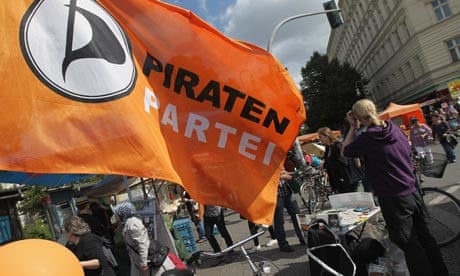It's a fairytale success: two years ago, hardly anyone knew that the Pirate Party even existed; now, all of a sudden, it has won seats in state parliaments in four successive elections, and a new poll puts them at 11% of Germany's national vote. And that's despite still not having any clear stand on important issues such as Afghanistan or the euro crisis. The German press is bewildered and horrified by turns. The Pirates are a chaotic bunch, they say, a protest party without a real political agenda. A group of internet addicts, nerds who primarily want to download music and films for free.
Anyone who wants to understand the potential of the Pirate Party must first realise that the internet is more than a technical means to an end and more than a playground for file sharers. The internet is the birthplace and living space of a communication society and therefore the key to the transformation of an era; its far-reaching effects will one day be ranked alongside those of trains, planes and automobiles.
Overcoming barriers is about freedom. This is the point that is clearly so difficult to convey. The Pirates are not an internet party but a party interested in freedom. The internet can be seen as a metaphor for what that means today: freedom through equal rights, freedom through the expression of opinion, freedom through open access to education and knowledge. Freedom through the erosion of hierarchy and authority. And freedom through participation and pluralism.
No other party in the political spectrum right now is dedicated to serving freedom in that sense of the word. The Pirates fill a gap. They are the only German party that treats freedom not just as an idealistic utopia or an economic principle but as a very real tenet of organisation. They want to protect civil rights, to increase every individual's range to take action, and to give citizens more power to take part in political decisions through electronic means.
This means that they are at odds with the traditional categories of "left" and "right". In their mistrust of the state and calls for transparency, they are reminiscent of libertarian movements of Anglo-Saxon origin, be they Ayn Rand fanatics or anarchically-minded socialists. At the same time the Pirates call for an "unconditional basic income", a financial safety net that the state should provide for every citizen. Their preoccupation with the boundaries of intellectual property has even led to some observers calling them communists. The Pirates' success is due not least to their rejection of conventional political views. But they are not a reaction to the financial crisis – instead, they profit from the fact that an increasing proportion of the electorate feel that the traditional political parties do not speak to them any longer.
Germany now has about 2.5 million self-employed people who work on their own – freelancers and owners of small businesses without any employees. Artists, freelance programmers, tilers and hairdressers number among them. These people are not from the traditional Mittelstand of medium-sized enterprises; many of them have just enough to live on. They are neither entrepreneurs nor industrial workers, so they do not find their political home with either the conservatives or with the social democrats.
As the working world has changed, so too have family structures. There are now all shades of families, from the single working parent to more complex families with more than one father to gay couples with a child.
Different ways of working and different family groupings have given rise to a growing section of society to whom the established parties can offer no answers. The self-employed fall through the health insurance and pension nets, and battle their way every year through a taxation system that is set up either for employees with regular incomes or bigger companies with accounts departments. Lack of childcare is a problem that is as well known as it is unresolved, but flexible working – job-sharing, a four-day week or switching between working in the office and at home – continues to be a distant prospect shrouded in mist.
This is the point at which the generational conflict ignites, a conflict that many assume no longer exists just because parents and children wear the same trainers these days. While younger people are completely redefining the boundaries between work and leisure, job and family, older politicians can only see their desire to live their lives more freely as creating chaos for themselves or as an expression of need.
Traditional political parties' unwillingness to adjust to the new ways of living and communicating is winning the Pirate Party popularity. It has the potential to become nothing less than Germany's new liberal social-democratic party. Whether that will happen depends on how far the Pirates succeed in drawing up convincing political demands based on their core principle of freedom.
